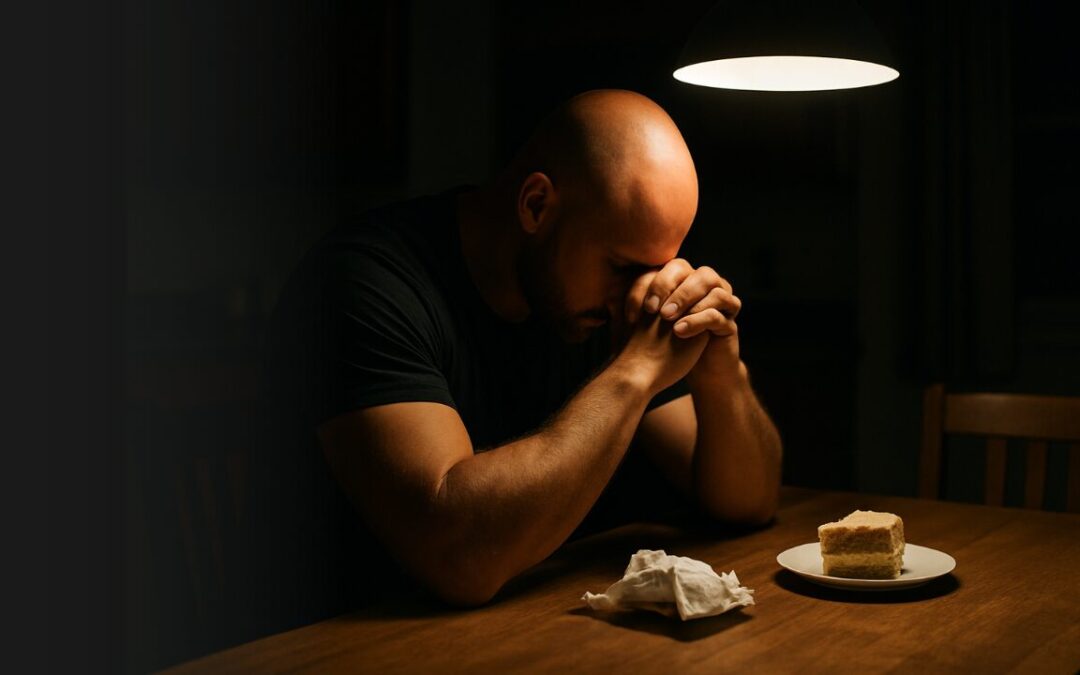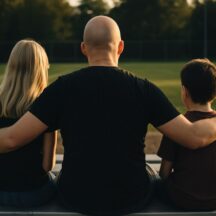I used to think the problem was food. That if I just found the right plan, the right list of foods, or the right restriction, I could finally get healthy. Keto. Vegan. Carnivore. Calorie counting. I tried all of it.
One week it was only meat and eggs. The next, it was plants and smoothies. I even considered some of the crazier extremes people joke about: watermelon diets, Twinkie diets, anything that promised results. The food kept changing. The goal stayed the same. But the outcome never lasted.
Eventually, I had to ask the harder question: If the food keeps changing, but the cycle keeps repeating, is food really the enemy? What if it’s not about food at all?
The Shame Stack
Every time I failed a diet, the shame got heavier. Every slip-up felt like a step deeper into the pit. And after a while, it didn’t matter how good I looked or how much progress I made. I only saw how far I still had to go.
I didn’t want people to see my failure, so I kept trying in secret. Starting over in silence. Quitting in silence. Judging myself harshly while putting on a brave face.
But food wasn’t the real issue. The real issue was the war in my mind. The habits I picked up from childhood. The emotional wiring that connected food to comfort, celebration, reward, and escape.
That shame stack builds slowly—diet after diet, start after restart. And when you believe the lie that you’ll never get it right, it can keep you trapped for years.
Why We Run to Food
We run to food when we’re stressed.
We run to food when we’re sad.
We even run to food when we’re happy.
It’s baked into us—pun intended. Growing up, food was always part of joy. Cookies meant comfort. Big meals meant celebration. It wasn’t just nutrition. It was emotional currency.
And when you grow up around addiction—whether it was drugs, alcohol, or food—you start to see the patterns. People running to something outside themselves to feel okay inside. That was me.
I saw it in my family. Food was often a way to cheer up, to make the moment better, to create a little happiness. Not inherently bad—but when it becomes your only coping mechanism, it starts to control you.
The Religious Rules Trap
For a while, I got super strict. Followed all the rules. Measured everything. Tracked everything. It worked… until it didn’t.
Eventually, I realized more rules didn’t bring more freedom. They brought more opportunities to fail. More reasons to feel guilty. More ways to tell myself I wasn’t good enough.
It reminded me of the Old Testament—all those laws and rituals that never fixed the real problem. They just showed how broken we are. And how badly we need grace.
Jesus came to lift that weight. He didn’t say, “Try harder.” He said, “Come to me, all who are weary.” That includes the food-weary. The body-shaming. The guilt-ridden.
Rules didn’t save me. Jesus did.
Stop Treating Your Body Like a Trashcan
You know that pressure to finish everything on your plate? Or the guilt of wasting food? So you force it down, even though you’re full. I used to say, “Well, I don’t want to throw it away.”
But here’s the truth: that food was meant for the trash. And instead of putting it there, you put it in your body.
Don’t treat your body like a trashcan.
That one line helped rewire something in me. You don’t have to finish it. You don’t have to carry the guilt. Your worth isn’t tied to how clean your plate is.
Just because something’s on your plate doesn’t mean it belongs in you.
A Better Way
I still track my food. I keep my calorie goals tight. But the difference now is how I think. I’m not chasing the perfect food anymore. I’m not trying to white-knuckle my way to discipline.
I’m learning to live with intention. To forgive myself faster. To stop the shame spiral before it starts.
When I mess up now, I don’t throw everything out the window. I reset the next meal. I don’t binge because I’m already “off track.” I remind myself: You’re not starting over. You’re still on the path.
Most days, I follow a rhythm: a high-protein breakfast, a light lunch, and a flexible dinner depending on what the family’s having. I track with an app and aim to stay within my target—around 1730 calories right now. Some days I hit it, some days I don’t. But the key difference? I’m not crushed by it anymore.
And most importantly, I turn to God. Not food. Not restriction. Not punishment.
You Don’t Need More Willpower. You Need More Grace.
If you’re like me, you’ve probably tried it all. Maybe you’re still in the cycle.
Let me tell you something that took me years to see: You’re not broken. You’re just stuck. And the way out isn’t through another diet. It’s through healing.
Ask yourself why you’re eating.
Ask yourself what you’re really craving.
If it’s comfort, God offers it.
If it’s peace, God promises it.
If it’s identity, God gives it.
Food isn’t your enemy. Shame is.
And the sooner you stop fighting food, the sooner you can start fighting for yourself.
You’re worth the fight. And you’re not in it alone.
Want to build something stronger than another short-lived diet?
Check out the Start Strong devotional—a 30-day guide to rebuild your discipline, mindset, and identity through daily time with God. Not perfection. Just presence. Just progress.
Your story’s not over. Let’s write the next chapter together.












